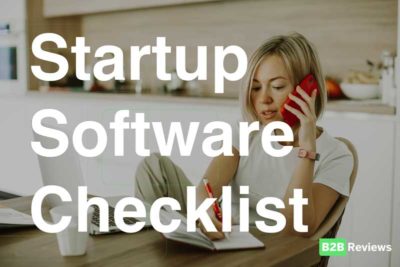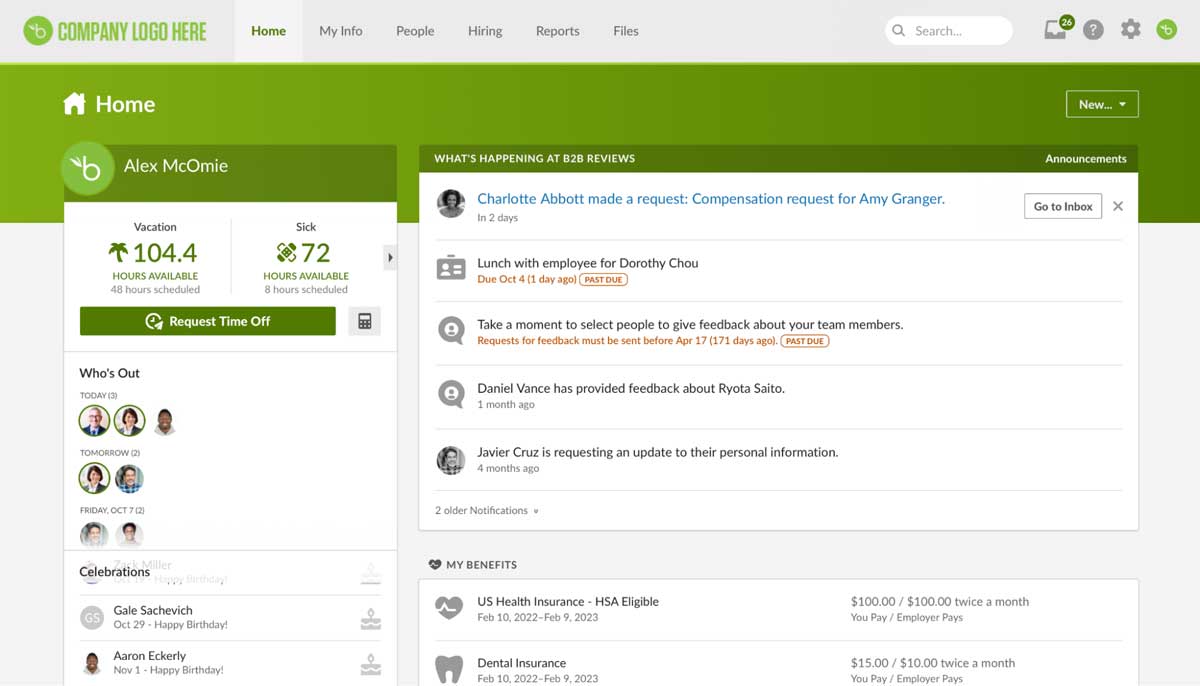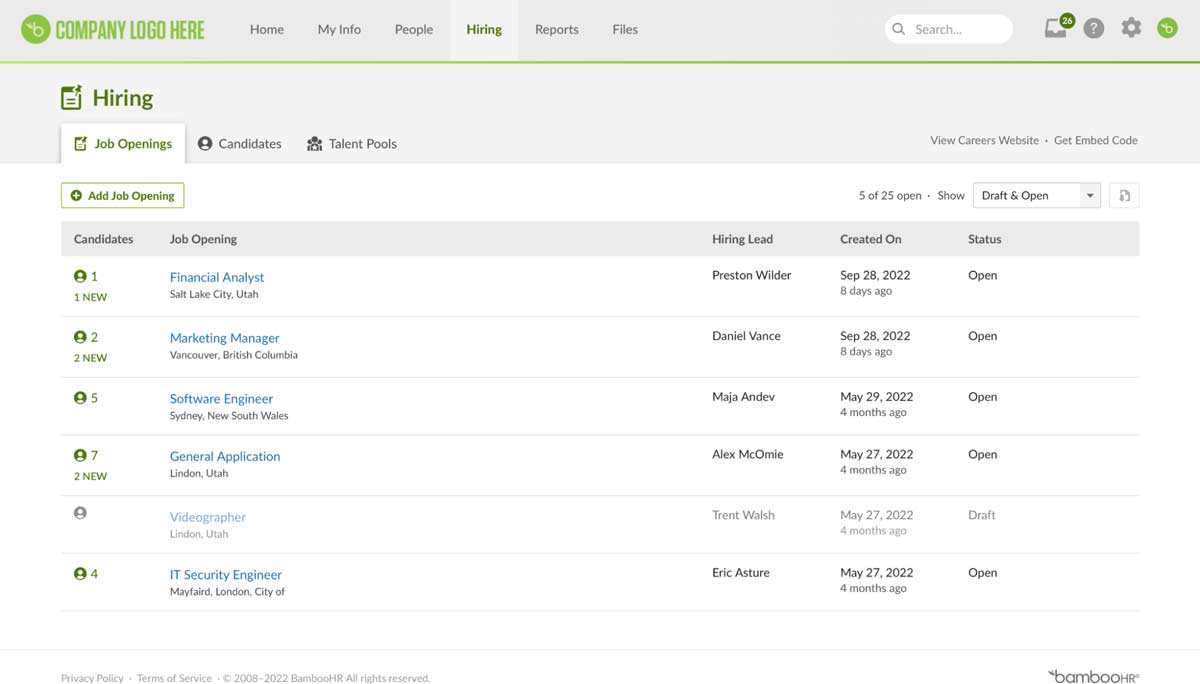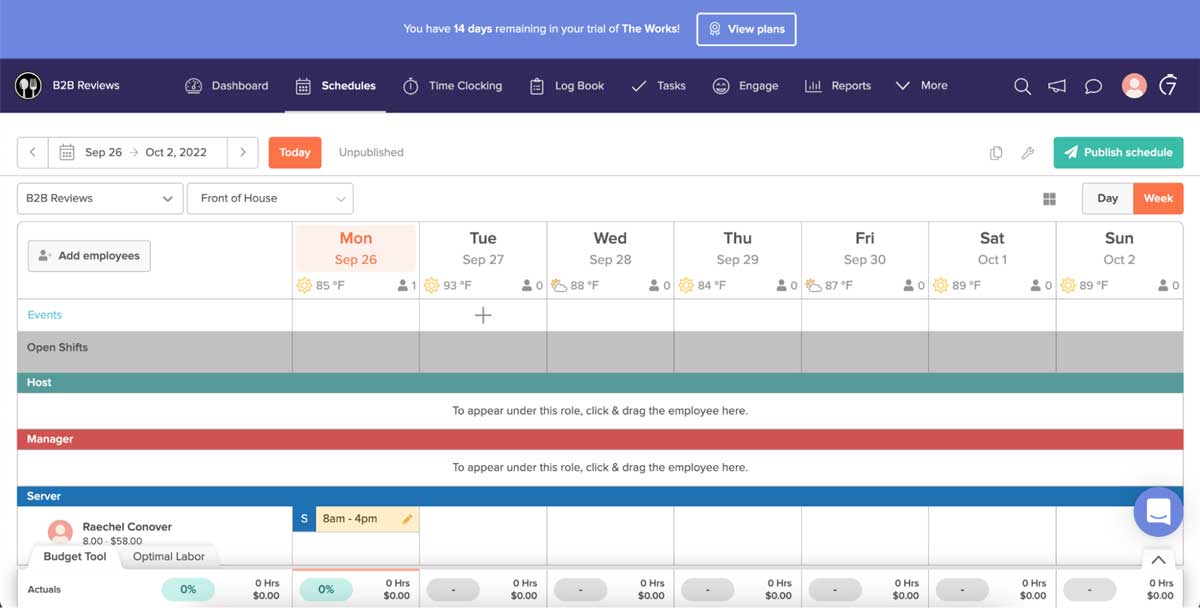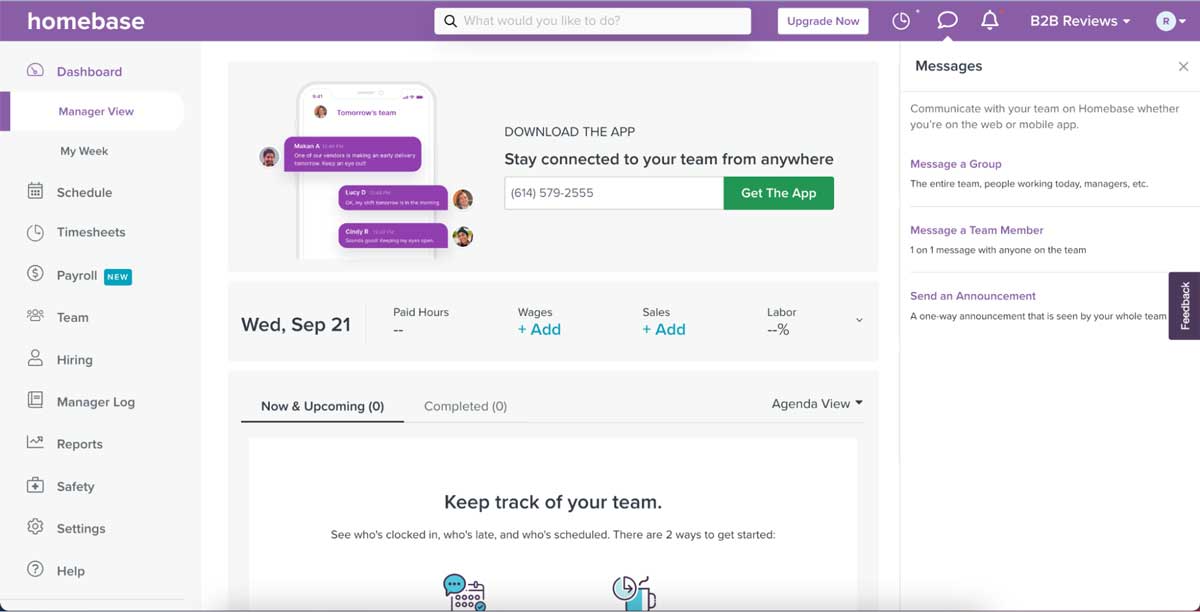We may earn money when you click on links to our partners. Advertiser Disclosure
Entering the market with a new business can be scary. Entering the market and taking it by storm can be downright daunting, but that’s exactly what start-ups do. According to Steve Blank, famed Silicon Valley Entrepreneur and Author, a start-up is an organization that searches for a repeatable and scalable business model. Not one that just executes it. They enter a market with the intent to change the market by finding a scalable, repeatable process that works quickly and efficiently to make them a top name in their respective market.
To do this, start-ups need to have all the best business software in place to run successfully right out of the gate. Therefore, software for small businesses should be able to scale quickly with them as they climb to the top of the market. The following are software for start-up tools that every start-up needs to scale to the top and stay there.
HR tools for startups
Whether your start-up will have two employees or 100, you need some HR tools to build your team. A good applicant tracking system and an employee background check software will help you recruit and hire the best talent to take your business from start-up to dominant in your market.
Applicant Tracking Systems
When it comes to hiring the right employees, an Applicant Tracking System (ATS) is a must-have. The best applicant tracking system will help you manage and organize incoming resumes and rank candidates based on the requirements for each role.
This system goes a long way in improving your business, as a good hire has a trickle effect on your business. An applicant tracking system creates an improved hiring decision-making process and leads to making better hires, which in turn means better teams and, ultimately, better business decisions.
For start-ups, we like BambooHR. Not only is it a great applicant tracking system, but it can also do onboarding, hiring, and payroll, and it can do them all for free. And while it does all these things, its greatest feature is that it helps small businesses and start-ups scale up their hiring processes.
Schedule BambooHR Demo Visit BambooHR’s website.
Employee Background Check Software
Going hand in hand with an applicant tracking system is employee background checks software. Employee background check software allows you to hire the most qualified and best employees for your open positions. It checks and verifies things that ensure the applicant is who they say they are and possess the right qualifications that they say they have.
When it comes to employee background check software, our top pick for start-ups is GoodHire because it applies to every industry. It has a detailed resource library that will help start-ups identify what checks they need to be running, provides highly detailed reports, and allows for custom packages so start-ups can pick and choose what features they need and add more as they grow and scale.
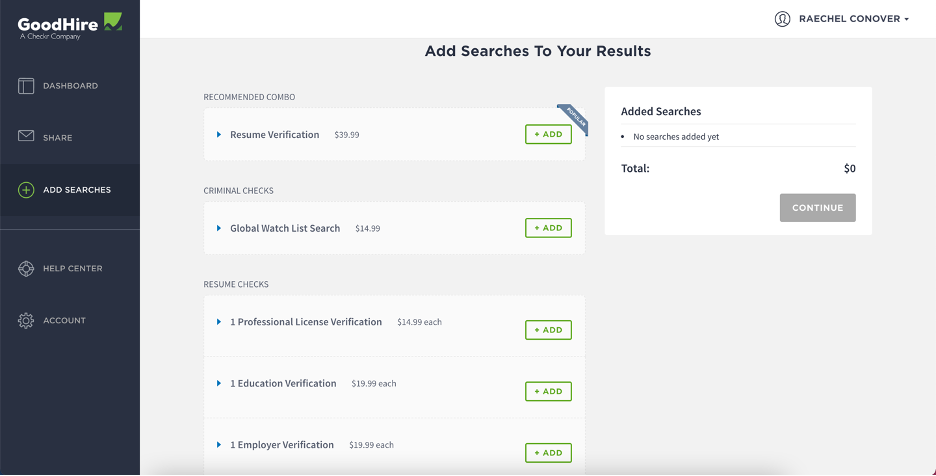
GoodHire candidate dashboard.
Team management tools
Once you hire employees, you need to manage your workforce. Tools like PEO software that can step in and act like HR, as well as payroll software, can go a long way in simplifying your employee management processes and procedures, freeing up your time so that you can focus on other business areas of your start-up.
PEO Companies
Professional employer organizations (PEO) help businesses with several HR tasks such as tax filing, payroll, HR compliance, benefits, and more. As a small start-up, they are instrumental because they take on the role of a co-employer and can offer your talent better benefits than you could solo, meaning that you are more competitive and able to hire better talent.
One PEO that we especially like for start-ups is Rippling. It’s designed to be affordable to small businesses and start-ups while helping simplify complex employment issues. It serves companies in every stage of growth, making it ideal for start-ups with unique employee situations due to rapid growth.
Another great option for smaller teams is Gusto, which offers benefits and other HR solutions on top of it’s payroll software. If you aren’t big enough to use a PEO, Gusto will still allow you to offer benefits to your employees, but won’t act as a co-employer like a traditional PEO.
Get Started with Gusto Visit Gusto’s website.
Payroll Software
Payroll software helps start-ups handle payroll – a very tedious and time-consuming task. It enables start-ups to pay employees on time and accurately, creating trust. It also ensures that your start-up is compliant for tax purposes, and it frees up your time so that you can focus on other business activities.
Of the payroll software we researched, we like Patriot and OnPay best for start-ups. Patriot is the cheaper of the two and is more of a subdued option for start-ups that want to do more themselves at the beginning. But don’t worry; it’s easy and affordable to scale up to a full-service plan as you scale and grow. OnPay, on the other hand, is one flat rate and a full-service payroll program right out of the gate. It does everything, meaning you can save time and assign your HR team to tackle other tasks.
Business operations & productivity tools
To keep the business running smoothly without issue, you will need tools that specifically help with the day-to-day operations. Contract management software, project management software and employee scheduling systems will keep start-ups moving toward their bigger goals.
Contract Management Software
Contract management software helps businesses store, organize, and streamline the process of completing contracts. No more searching through files and papers to find contracts, no more missing renewal deadlines, and no more paying to mail contracts or waiting forever to get signed contracts back.
Regarding contract management software, users we surveyed have found that with the spike in hybrid and remote workers in recent years, using contract management software makes it especially easy to onboard remote workers. Many users we surveyed use the popular DocuSign for its ease of signing, automation, streamlining, and generally simplifying the highly complex approval routings of contracts that go through multiple hands.
Project Management Software
Project management software helps businesses track all aspects, such as goals, resources, expenses, and the progress of projects. All moving parts are streamlined into one central program that helps start-ups complete projects on time and within budget.
When it comes to project management for start-ups, we like Monday.com and Zoho Projects. Monday.com is ideal because it offers a lot of customization options. As a start-up, you will no doubt need to customize and change your tasks from project to project, and this business software lets you do just that and automate tasks as needed.
Zoho Projects is another good choice because it offers the most features at the lowest price point. Our favorite feature is the issue management feature that shows you when your project deviates from your planned progress – something all start-ups need as they concentrate on growing quickly.
Employee Scheduling Software
Managing employee schedules can be tedious, no matter if you have two or 200 employees. You’ll need to consider tracking time off requests, employee overtime, availability, and more. Tracking all this manually is a full-time job. Enter employee scheduling software to handle it all for you.
For start-ups, we recommend choosing between Homebase, Deputy, and 7shifts because they all offer a free version that covers basic employee scheduling needs. Start-ups can scale up as needed to more robust paid versions of each as they grow.
7shifts is geared towards restaurant workers and the unique scheduling needs of restaurants, while Deputy is best for companies with multiple locations. Homebase works best for small businesses.
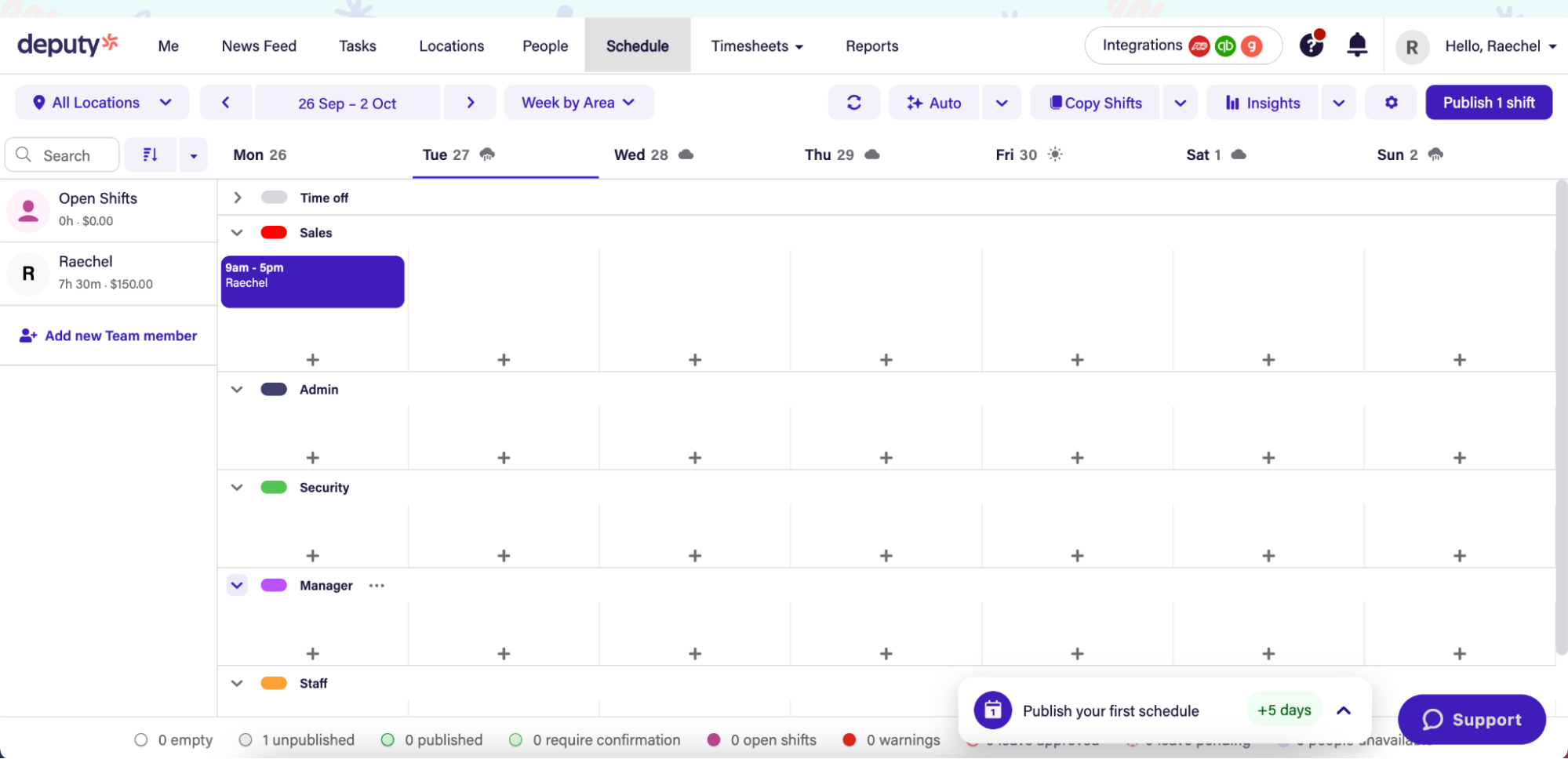
Deputy schedule view
Sales and marketing software
As a start-up, you need to get the attention of your potential customers quickly. Business software examples that help you do that include CRM software, website building software, social media management tools, email marketing software, and analytic tools.

Website builders
A website is the easiest way to showcase your company’s products, services, and stories from any device, anywhere. Building a great website that visitors enjoy starts with having an easy-to-use website builder.
Three vendors: WordPress, Squarespace, and Wix, are great for startups that need out-of-the-box website solutions to get up and running quickly.
Paid plans with WordPress start at $4 a month for a free domain (for one year), hosting, payment collection, unlimited email support, and the removal of WordPress.com ads. Should you decide to self-host your site, WordPress.org will let you use its open source version of the website software for free. Squarespace starts at $16 per month for two contributors and mobile-optimized websites, including 24/7 customer support, a custom domain name, SSL security, unlimited bandwidth, 30 minutes of video storage, SEO tools, basic metric reports, and templates. Finally, Wix starts at $16 a month. You get a free custom domain for one year, a free SSL certificate (for a layer of web security), the removal of Wix ads, 2 GB of storage space, and 30 minutes of video.
Analytics
To measure how your advertising and marketing campaigns are doing and find out exactly what path customers are taking on your site, turn to Google. Google offers both Google Analytics and Google Trends for free.
Google Analytics will measure specific analytics on your websites, such as your traffic sources and how your customers interact on your website, as well as your customer demographics and marketing channels that are bringing customers to your site.
Google Trends, on the other hand, tells you what is trending worldwide and locally to you so you can build your campaigns around trends. You can also research the popularity of the keywords you want to use.
For more robust reporting (with a minimally more complex integration), check out Mixpanel, who has a free tier that’s suitable for most startups. Lastly, you’ll likely need to integrate other analytics tools or tags into your site, and when you do, check out Google’s Tag Manager.
Social Media
Everybody who is anyone has a social media account, and the same goes for your startup. Social media can help your business reach your target audience, get to know their behaviors and preferences, and affordably raise your brand’s awareness. Several software systems make managing your social media easier, like HootSuite and Buffer.
The idea behind HootSuite is to set it and forget it. For $49 per month, you get one user on up to 10 social media accounts with unlimited posts and post scheduling. With Buffer, there is a free option, but it is limited to just three social media channels with just ten posts on each per month. A better option might be the Essentials plan which costs just $5 per month per channel, and you can schedule up to 2,000 posts per channel per month.
Email Marketing
When done correctly, email marketing shows your customers your sales funnels and drives revenue. Mailchimp and Constant Contact are both excellent choices in email marketing service providers.
Mailchimp offers a free program that allows one user, 500 contacts stores, and 2,500 emails sent per month. If you need more, you can move up to $11 monthly for three users, 50,000 contacts stored, and 5,000 emails sent monthly.
Constant Contact bills a little differently and is based on the number of contacts you have. For $9.99, you can store up to 500 contacts, and the price increases with each contact you add beyond that. Your send limit is also based on your number of stored contacts, and you can send up to 24 times the number of contacts you have stored.
CRM
Customer relationship management (CRM) software is an all-in-one small business software that helps start-ups track who they interact with, when, and the outcomes. It’s designed to get teams on the same page and project a united front to customers and potential leads. Ultimately it helps businesses close deals and meet customer needs faster and more efficiently.
The CRM software programs for a start-up that we recommend includes FreshSales and HubSpot. We like FreshSales because it helps small businesses and startups grow by shortening the sales process, growing sales quickly, and improving customer interactions through personalized engagement. HubSpot offers a feature-rich free CRM program to help start-ups close more deals, build relationships, and manage their pipeline for future growth.

Making sense of it all
Hitting the ground running as a startup is imperative to your success. By utilizing this checklist, you should be able to identify the proper tools and software that you need to break onto the scene and make a name for yourself quickly.
We understand that not all the tools and software mentioned will apply to everyone, and that’s okay. But if there is a category not mentioned that you would like information about, please reach out, and we’ll do the research for you.
